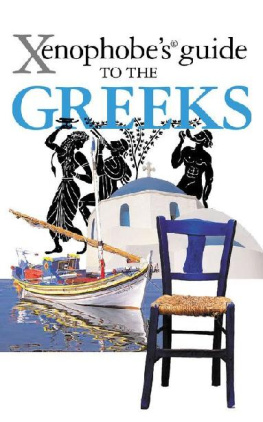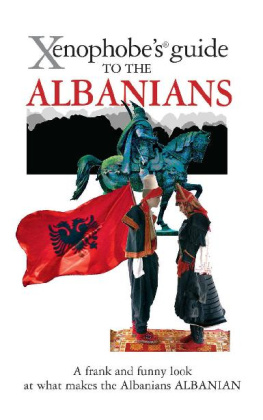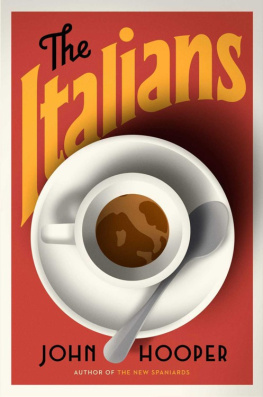Martin Solly - Xenophobe's Guide to the Italians
Here you can read online Martin Solly - Xenophobe's Guide to the Italians full text of the book (entire story) in english for free. Download pdf and epub, get meaning, cover and reviews about this ebook. year: 2008, publisher: Oval Books, genre: Home and family. Description of the work, (preface) as well as reviews are available. Best literature library LitArk.com created for fans of good reading and offers a wide selection of genres:
Romance novel
Science fiction
Adventure
Detective
Science
History
Home and family
Prose
Art
Politics
Computer
Non-fiction
Religion
Business
Children
Humor
Choose a favorite category and find really read worthwhile books. Enjoy immersion in the world of imagination, feel the emotions of the characters or learn something new for yourself, make an fascinating discovery.
- Book:Xenophobe's Guide to the Italians
- Author:
- Publisher:Oval Books
- Genre:
- Year:2008
- ISBN:9781908120618
- Rating:5 / 5
- Favourites:Add to favourites
- Your mark:
- 100
- 1
- 2
- 3
- 4
- 5
Xenophobe's Guide to the Italians: summary, description and annotation
We offer to read an annotation, description, summary or preface (depends on what the author of the book "Xenophobe's Guide to the Italians" wrote himself). If you haven't found the necessary information about the book — write in the comments, we will try to find it.
Xenophobe's Guide to the Italians — read online for free the complete book (whole text) full work
Below is the text of the book, divided by pages. System saving the place of the last page read, allows you to conveniently read the book "Xenophobe's Guide to the Italians" online for free, without having to search again every time where you left off. Put a bookmark, and you can go to the page where you finished reading at any time.
Font size:
Interval:
Bookmark:
The Xenophobe's Guide to the Italians
by Martin Solly
Beginning

The Italian population is 58 million compared with 7.6 million Swiss, 8 million Austrians, 10 million Greeks, 52 million English, 64 million French, 82 million Germans, and 307 million Americans.
Italy is 7 times larger than Denmark and 3 times larger than Austria, but could fit nearly twice into France.
Nationalism & Identity
The Italians are not a race, but a collection of peoples. They tend to think of themselves and each other first and foremost as Romans, Milanese, Sicilians or Florentines, and secondly as Italians. There is little that really links Turin and Bari, or Naples and Trieste, except the autostrada, the rail network and the Catholic Church.
Deeply ingrained regionalism is quite understandable considering that Italy has only existed as a nation since 1861.
The regions of Italy are very different from one another and the deeply ingrained regionalism is quite understandable considering that Italy has only existed as a nation since 1861, before which the Italian peninsula consisted of several independent states. The unification process required a skilful exercise in geopolitical patchwork, and the leading politicians of the time were well aware of the difficulties ahead. They included Massimo DAzeglio who said: Italy has been made at last; now let us make the Italians. Were he alive today, he would still be working at it.
Every now and then the Italians do try and behave like a nation and make a big effort to be nationalistic, for example, when the Italian football team is doing well in the World Cup, or Ferrari has just won the Formula One World Championship twice in a row. But mostly the Italians feel like Italians when they are expatriates: in an ice-cream parlour in Melbourne, down a Belgian mineshaft, or at a soccer match in the United States.
Knowing that most disputes can be resolved by a mixture of compromise, appeasement and bribes, Italians will do their best to avoid confrontation.
This lack of confidence is in reality only skin-deep as all Italians know that, of course, they do everything better. Their strong national pride is usually hidden, but can surface on occasion. There was an outcry when it was noticed in a TV close-up before a football international that none of the Italian team (the jewel in the nations crown) was actually singing the national anthem; it turned out that they didnt know the words. They were in disgrace and severely criticised until a sports journalist pointed out that few other Italians knew the words either. Since then the television channels have been doing their best to remedy the situation by playing the anthem more and, whenever possible, with subtitles.
On the positive side, the absence of overtly nationalistic feelings makes Italians wary of warmongering and jingoism. Knowing that most disputes can be resolved by a mixture of compromise, appeasement and bribes, Italians will do their best to avoid confrontation. In fact, any foreign power planning to invade Italy should consider making an offer before wasting soldiers lives. If the price is right, it is quite conceivable that the Italians might just agree to sell their country.
CampanilismoIdentity is important to the Italians. Perhaps because they are slightly uncertain about their Italian-ness and not exactly sure what their national identity actually entails, they are particularly attached to their roots. Where do you come from? is an important question for Italians which requires a good answer. Unlike the Englishman or American, no Italian is ever at a loss when asked this question. He does not stutter, Im not really sure. Let me think. I live in London, but I was born in Hertfordshire, but my parents moved to Leeds, and I went to university in Bristol and then my first job was in Southampton
Italians know exactly where they come from, and will carry that place around with them for life, like a standard.
Italians know exactly where they come from, and will carry that place around with them for life, like a standard. The man from San Giorgio in Puglia who lives in Turin will maintain his links with San Giorgio all through his life. Even if he left the town 30 years ago, and only goes back once a year to see his second cousins, he will still have to help anyone else who comes from San Giorgio. Similarly, successful tycoons and politicians are supposed to look after their hometowns, investing money in them and finding work for their fellow townsfolk.
Stating where you come from is closely linked to the key Italian concept of campanilismo, which literally means loyalty to your local bell-tower, but really involves thinking that your village or town is the best in the world. Italians have always loved their hometowns and found it hard to be exiled from them.
Italians know that other Italians are sadly lacking in self-discipline and cannot be trusted.
Such civic pride, however, also implies great competition, and this is especially strong between neighbouring villages, towns, provinces and regions. The rivalry is often so fierce that Italians have little time left for much else, for they know that other human beings, and especially Italians from other families, villages, towns or regions, are sadly lacking in self-discipline, and cannot be trusted. How wonderful Italy would be without gli altri those other Italians.
How others see themThe typical stereotype of the Italians is that of a noisy, passionate, scheming, Mediterranean people, whose brilliance and inventiveness are unfortunately marred by laziness and unreliability. Italians are known to live in a beautiful country full of art treasures. They are seen as a happy, fun-loving people, with a genius for design, food and fashion. They are known to be wonderful at singing and at cooking, and terrible at organising. Italian men have greased-back hair, nine-inch hips and are demon lovers. Italian women are incredibly attractive until they marry, whereupon they immediately become short, fat, overweight mammas.
They are known to be wonderful at singing and at cooking, and terrible at organising.
Italo-Americans often imagine that Italy hasnt changed since their great-grandparents left it at the turn of the century. When they finally come to Italy to find their roots and visit their cousins, they are surprised that not all families are poor, have ten children and live in one room which they share with a donkey and a mongrel; that not all the women wear black and work in the fields, nor do all the men wear hats and sit in bars all day long. They discover that Italy is, in fact, one of the worlds most advanced countries, where most families have at least two cars and live in houses that dont just have running water and electricity, but plasma screen televisions, broadband Internet access, hightech cellphones and bidets with mixer taps and adjustable jets.
How they see themselvesThe Italians see themselves as passionate and charming and they like to act the part for the benefit of foreigners.
They know they are privileged, living in Italy, but they fight hard to keep at bay a nagging feeling of being the Cinderella of Europe. The reluctance of certain nations to embrace the European Union is bewildering for most Italians, who would be more than happy to contract out the running of their country to Brussels.
No criticism is ever taken seriously enough to attempt remedial action.
With unwitting masochism, Italians genuinely rather enjoy seeing their faults thrown back at them. It confirms their own deep-rooted feeling that
Font size:
Interval:
Bookmark:
Similar books «Xenophobe's Guide to the Italians»
Look at similar books to Xenophobe's Guide to the Italians. We have selected literature similar in name and meaning in the hope of providing readers with more options to find new, interesting, not yet read works.
Discussion, reviews of the book Xenophobe's Guide to the Italians and just readers' own opinions. Leave your comments, write what you think about the work, its meaning or the main characters. Specify what exactly you liked and what you didn't like, and why you think so.











